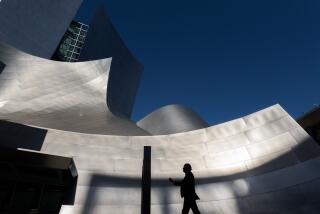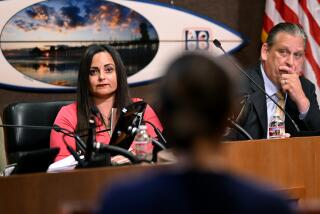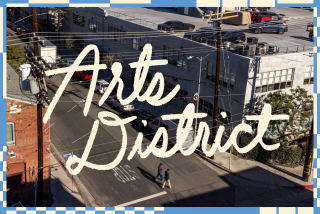Laguna Beach’s mayor calls for ‘art renaissance’
Laguna Beach’s new mayor, Bob Whalen, said the city “needs an art renaissance” and suggested that development of a cultural arts center may be worth pursuing.
As he discussed goals for the coming year, Whalen noted that the city has a number of items on its priority list, such as improvements on Laguna Canyon Road, closing a portion of Forest Avenue to promote more pedestrian activity and a plan eventually to place more utilities underground.
But Whalen, 61, who has lived in Laguna Beach for 30 years and enters his third year on the City Council, spent considerable time discussing the city’s arts scene, for which Laguna is renowned. Whalen noted that some local arts institutions were operating on the margins, while others struggled to find venues to show their work.
Local artists need a central location to showcase their work and groups like Laguna Beach Live! could also benefit from having a dedicated facility, he said.
“When I look at the history of Laguna Beach, two traits come to mind: natural beauty and that this is an arts community,” Whalen said. “We need an art renaissance in town.”
Candidates in November’s City Council election floated the idea of a cultural arts center and Whalen believes it’s an idea worth looking into.
“If there is an interest in a cultural arts-type building, then perhaps it could be a public-private partnership,” said Whalen, who has spent 32 years as a public finance attorney at Stradling, Yocca, Carlson and Rauth, which has a Newport Beach office.
Whalen specializes in bond work for state and local agencies, including school districts, counties, cities and water districts.
Encouraging donors to earmark funds for the arts would be crucial to success, Whalen said, referencing the recent $10 million gift that Mission Hospital Laguna Beach received for its emergency department from PIMCO co-founder Bill Gross and wife Sue.
“Part of our job [as City Council members] is to inspire conversation in the community that leads people to look at issues, think differently and be willing to take bold steps to create a better Laguna,” said Whalen, who graduated from Harvard University in 1975 with a degree in urban studies. He later earned a law degree from UC Berkeley.
Whalen served on the Laguna Beach Unified School District board from 1997 to 2006 and on the Planning Commission from 2008-12, the year he was elected to the council.
In addition to the arts, Whalen said another focus in the new year will be revising the city’s Downtown Specific Plan. Urban planning firm MIG has been hired to help prepare the update and will focus on reaching out to the public for suggestions and developing recommendations.
The company could look at building heights, use of public space, parking and traffic circulation. Whalen said he will ask the council to vote within the next two months on a proposal to close a portion of Forest Avenue to vehicles at certain times “to promote greater pedestrian activity downtown and increase sales for the merchants.”
As for placing power poles and other utilities underground, the city currently takes a neighborhood-by-neighborhood approach. Whalen said it may be more cost effective and efficient for the city to devise a comprehensive plan.
“It takes five to six years from planning to underground utility poles,” Whalen said. “Half that time is spent on planning. One of my ideas is to do front-end planning where all the involved entities do their drawings so when you get to a particular neighborhood, we don’t have to wait to plan it.
“Would the community support a bond measure to underground utilities? It’s a public safety and aesthetics issue, but primarily a public safety issue,” he said. “History shows that cities which have undergrounded utility poles see property values go up. Imagine having unobstructed views of the ocean or hills if you get the poles underground?”
More to Read
Start your day right
Sign up for Essential California for news, features and recommendations from the L.A. Times and beyond in your inbox six days a week.
You may occasionally receive promotional content from the Los Angeles Times.







